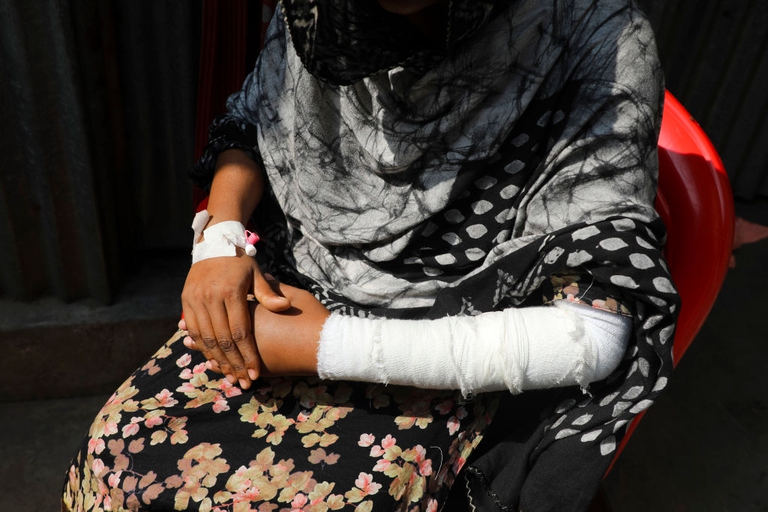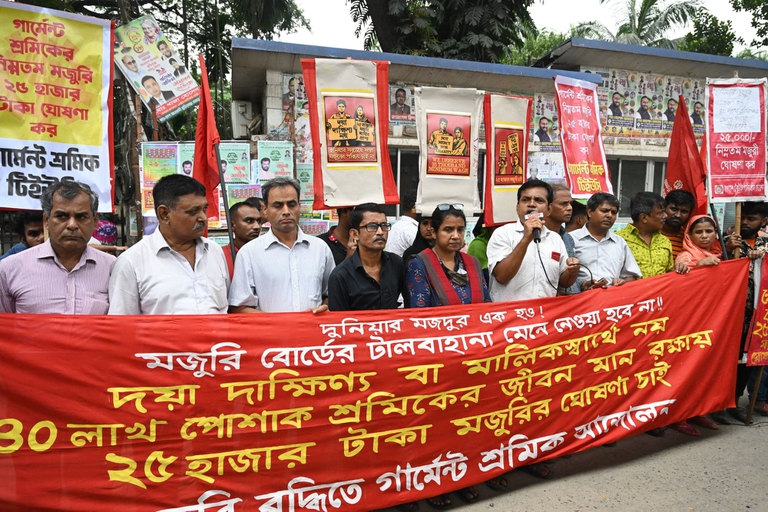https://www.lifegate.it/salario-minimo-moda-bangladesh
- |
Approximately 193 euros, 23 thousand Bangladeshi taka, this was the request of the unions in the ready-to-wear fashion sector in Bangladesh for the new minimum monthly wage that should have been established within the Wage Board, the committee that every five years brings together unions, government and businesses for this purpose.After a discussion between the parties, the government finally decided to 106 euros, 12,500 taka, just over half of the request (currently the minimum monthly wage established in 2018 is 8 thousand taka, or 68 euros).
For weeks Bangladesh has been crossed by strikes and trade union demonstrations who forcefully ask for a dignified adjustment to the current minimum wage for workers in textile and clothing factories.The demonstrations took place mainly in the capital Dhaka and in the industrial district of Gazipur and La violent repression by the police led to at least three deaths and countless injuries.This is what the Bangladeshi trade unions and the major international NGOs that support them denounce as Clean clothes campaign – Clean clothes campaign.

The calculation of the figure for the minimum wage in Bangladesh
Since 2018, the minimum wage in Bangladesh has never been adjusted to either inflation or the general increase in costs that occurred after Covid-19.The amount requested by the unions, 193 euros, was calculated by one independent study by BILS – Bangladesh institute for labor studies, which considers this figure the minimum for maintaining a family and covering basic expenses, such as food, rent and medical care.
“This is not only a sacrosanct request, but a request also justified by the growth of the sector in the last year:plus 35 percent for a total of 47 billion dollars in turnover for the country", explains Deborah Lucchetti, Italian coordinator of Clean clothes campaign.Bangladesh is the world's second largest producer of ready-to-wear clothing after China and counting approximately 4.4 million workers for approximately 3,500 factories.One of these was the protagonist of the tragedy of 2013 Rana Plaza collapse, which ten years ago opened a long discussion on the working and safety conditions of workers in this country.
Conflict of interest at the center of the discussion
Since then, freedom of association has suffered continuous attacks and is not guaranteed in practice, neither in the majority of factories nor on the streets, as demonstrated the repression of recent weeks which strongly discourages workers from joining a trade union.In Bangladesh, most members of Parliament are owners of fast fashion factories, "and this leads to an inevitable collusion between politics and business, which prevents an objective comparison.Yet, as we have underlined in our statements, the issue of wages should not be politicized.The demonstrations were not promoted by any party:we are talking about the pure survival of workers and their families", continues Lucchetti, highlighting the politicization aspect, which is particularly important because the next political elections will be held in January.

The lack of support from fashion brands
And what do the brands that buy this clothing say?“Nothing, and this is part of the problem,” continues Lucchetti, “we asked everyone to expose themselves, H&M, Asos, Primark, Zalando, Uniqlo, Marks & Spencer. Some brands have released generic statements, Alone Patagonia clearly expressed itself in favor of the figure of 23 thousand taka.However, as we have been saying for some time, their commitment must also be reflected in the way they negotiate with factories, without continuously aiming to lower prices, because this is the main knot that tightens the workers' necks".
As he also underlined Kalpona Akter, former worker activist and president of the Bangladesh Center for Workers Solidarity, in an interview with the national newspaper Daily Star, the pressure that workers suffer is a direct consequence of pressures that factories face from brands, who continue to carry out unfair purchasing practices, demanding ever lower prices.“To give a concrete example,” continues Lucchetti, “if a t-shirt is sold for 5 euros in Europe, the cost of labor is equivalent to not even 2 cents, or 3 percent of the final price.The workers asked to triple this figure, up to 6 cents.They didn't succeed."
A decent wage for all workers in the fashion supply chain
The question of decent wage in fashion has been at the center of the debate for some time, both the Clean clothes campaign and the NGO Fashion revolution launched the campaign in 2022 “Good clothes fair pay” campaign, to raise awareness of the issue among consumers around the world and ask for European legislation to guarantee the payment of decent wages to workers in the fashion supply chains.In this case, the campaign explained the difference between a minimum wage and a living wage, i.e. a salary that allows a worker to support himself and his family, send his children to school and cover all basic expenses while leading a dignified life and not on the brink of survival.
While Bangladeshi workers continue to make their voices heard by demonstrating, the question remains open and should lead everyone to reflect more on the hidden costs of clothing, not only in the so-called fast fashion sector but for all those brands that produce with global chains of supply and whose clothing we find in the shops of our cities.
